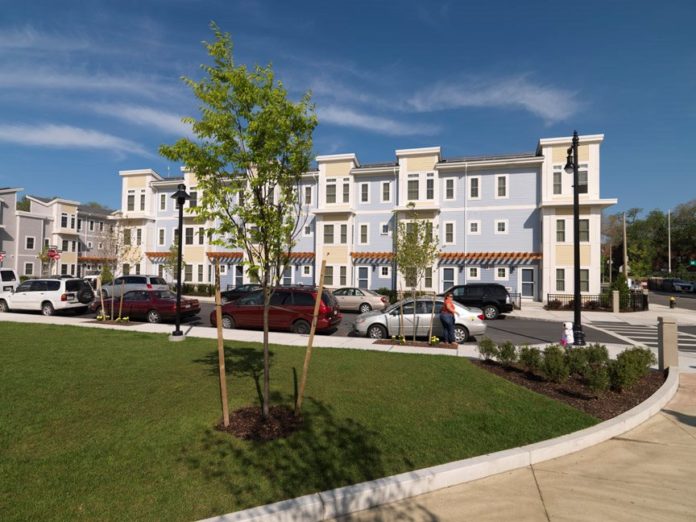| Beacon Communities to build 305 affordable apartments in South Boston, replacing 250 public housing apartments and adding another 55 |
|
Mayor Martin J. Walsh, Boston
Housing Authority Administrator Bill McGonagle, Beacon Communities LLC, and
community residents broke ground for the third phase of redevelopment of
the Anne M. Lynch Homes at Old Colony. Phase Three represents a $150-million
investment in this affordable housing project, including $25 million
contributed by the City of Boston. Beacon Communities will replace 250
outmoded apartments with 305 brand new affordable, sustainably-designed
apartments, which includes an addition of 55 new affordable homes.
“In Boston, our goal is to
build more opportunity for all as we continue to invest in Boston’s
future,” said Mayor Walsh. “This project is an important
milestone that will improve lives for hundreds of families in South Boston and
build homes that will last at Old Colony for another century.”
Phase Three builds on the
tremendous success of two previous phases of redevelopment. Nearly a decade
ago, BHA and the residents of Old Colony teamed up with Beacon Communities
Development to implement the master plan. The 2010 Old Colony Master Plan,
which was the result of broad stakeholder participation, reimagined the
historic public housing community and laid out a strategic vision to knit
Old Colony back into the fabric of the South Boston neighborhood.
Phases One and Two, completed in
2011 and 2015, created 285 new affordable apartment homes plus the new
Tierney Learning Center, which promotes education, wellness and community
building among Old Colony residents and the entire South Boston community.
Phase Three continues the transformation, and the net gain of 55
affordable housing units in this third phase of the redevelopment helps
achieve progress towards Mayor Walsh’s 2030 Boston housing goals.
The redevelopment replaces
buildings that are more than 75 years old and no longer meet families’
needs. The new apartments will be energy efficient, accessible, and
designed to meet “healthy homes” standards. Phase Three will
comprise three subphases. Phase Three A and Three B will replace the 250
existing units with 135 and 115 apartments, respectively. Phase Three C
will create 55 new apartments for seniors and people with disabilities,
adding to the City’s affordable housing stock. Phase Three of the
project will create more than 200 construction jobs.
Phase Three of Old Colony
continues the Walsh Administration’s work to increase affordable housing
through the city. In 2018, Mayor Walsh increased the City’s overall
housing targets from 53,000 to 69,000 new units by 2030, including 15,820
income-restricted units, to meet Boston’s population growth. These
income-restricted units will include purchasing 1,000 rental housing units
from the speculative market and income-restricting them through an expanded
Acquisition Opportunity Program. In addition, the City announced awardees
of an affordable housing funding round that included more than $16 million
in city affordable housing funds, and the first awards of Community
Preservation Act (CPA) funding for affordable housing development projects. As the City continues to make strides towards creating more affordable housing, it is also working with regional partners to ensure affordable housing is a reality throughout the region through the Metro Mayor’s Regional Housing Task Force. Mayor Walsh helped spearhead the execution of a recently-released regional housing production goal, which aims to create 185,000 new units of housing across the region by the year 2030. The proposed bills will enhance the work of the Metro Mayors Coalition. Earlier this year, Mayor Walsh also announced his legislative housing package, focused on housing security and economic mobility, expanding the work Boston has done to address the region’s affordable housing crisis and proposing new and existing tools to leverage Boston’s prosperity and create sustainable wealth opportunities for a more inclusive and equitable city. The housing security bills proposed seek to help existing tenants, particularly older adults, remain in their homes, and create additional funding for affordable housing. “Hundreds of families are already seeing the benefits of our efforts to revitalize Old Colony, and this project promises to make a significant difference for hundreds of future residents,” said BHA Administrator Bill McGonagle. “Phase Three will continue to improve lives and create opportunities in South Boston.” In addition to the financing from the City of Boston, Phase Three-like Phases One and Two before it-is receiving support from the Commonwealth of Massachusetts Department of Housing and Community Development and from MassHousing. Demolition to make way for the 135 new apartments in Phase Three A will begin in the coming weeks followed by construction which will last approximately 18 months. Residents who have been relocated will have the right to return to the community. “Beacon is excited about not only replacing the outdated remaining buildings in Old Colony with beautiful new buildings but also adding an additional 55 affordable apartments that will endure as quality housing resources long in to the future,” said Beacon Communities CEO Dara Kovel. “We are proud of our long partnership with the Boston Housing Authority and grateful to the many city, state and federal agencies and other partners who made this transformation possible.” About the Boston Housing Authority The Boston Housing Authority (BHA) provides affordable housing to more than 58,000 residents in and around the City of Boston. Residents are assisted through a combination of public housing and federal and state voucher subsidy programs that provide a wide variety of housing opportunities. As the largest public housing authority in New England, the BHA houses close to 9 percent of the city’s residents. Our mission is to provide stable, quality affordable housing for low and moderate income persons; to deliver these services with integrity and mutual accountability; and to create healthy living environments which serve as catalysts for the transformation from dependency to economic self-sufficiency. |













